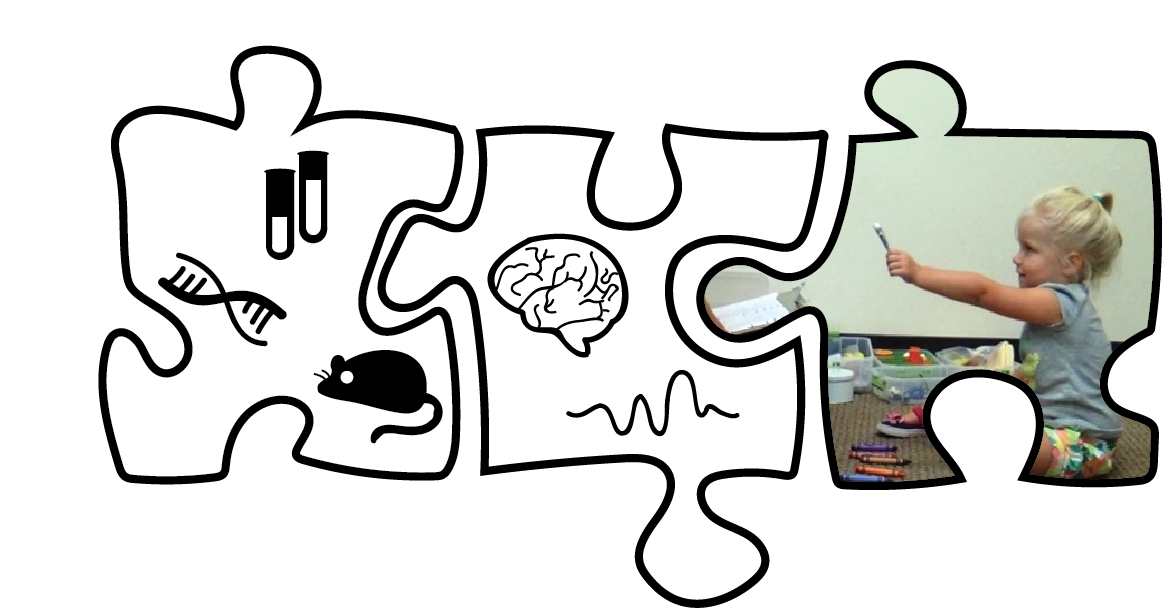Publications
Here you will find Dr. Barbara Thompson’s and the SEND Lab’s published work. Publications are listed chronologically by year, starting with the most recent.

Thompson, B.L. (2024). Understanding the Neurobiological Components of Neurodevelopmental Disorders. In M.G. Valdovinos (Ed.), Intellectual and Developmental Disabilities (pp.95-118). Springer Cham.
Gateau, K., Schlueter, L., Pierce, L.J., Thompson, B.L., Gharib, A., Durazo-Arvizu, R.A., Nelson, C.A., Levitt, P.: Exploratory study evaluating the relationships between perinatal adversity, oxidative stress, and infant neurodevelopment across the first year of life. PLOS Global Public Health. 3(12):e0001984. doi: 10.1371/journal.pgph.0001984.
Holland C.M., Sideris J., Thompson B.L., Levitt P., Baranek G.T. (2023) Exploring development of infant gaze, affect, and object exploration in a primarily Latino sample. Infant Behavior and Development. doi: 10.1016/j.infbeh.2022.101806
Gharib, A. and Thompson, B.L. (2022) Analysis and novel methods for capture of normative eye-tracking data in 2.5 month old infants. PLoS One.17 (12):e0278423. doi: 10.1371/journal.pone.0278423.
Reilly E.B., Dickerson K.L., Pierce L.J., Leppänen J, Valdes V, Gharib A, Thompson B.L., Schlueter L.J., Levitt P., Nelson C.A. (2022) Maternal stress and development of infant attention to threat-related facial expressions. Developmental Psychobiology. 64(7):e22332. doi: 10.1002/dev.22332.
Holland, C.M., Blanche, E.I., & Thompson, B.L. (2020) Quantifying Therapists’ Activities during Sensory Integration Treatment for Young Children with Autism. Physical & Occupational Therapy In Pediatrics, 41(3) doi: 10.1080/01942638.2020.1847235
Bilinovich, S.M., Lewis, K., Thompson, B.L., Prokop, J.W., & Campbell, D.B. (2020) Environmental Epigenetics of Diesel Particulate Matter Toxicogenomics. International Journal of Environmental Research and Public Health, 17(20), 7386. doi:10.3390/ijerph17207386
Valdes, V, Pierce, L.J., Lane, C.J., Reilly, E.B., Jensen, S.K.G., Gharib, A, Levitt, P, Nelson III, C.A., & Thompson, B.L. (2020) An exploratory study of predictors of cognition in two low-income samples of infants across the first year of life. PLOS ONE, 15(9): e0238507. doi:10.1371/journal.pone.0238507
Baron D, Holland C.M., Carlson K., Wolfrum E., & Thompson B.L. (2020) Adapting social conditioned place preference for use in young children. Neurobiology of Learning and Memory, 172, 107235. doi:10.1016/ j.nlm.2020.107235
Pierce, L.J., Thompson, B.L., Gharib, A., Schlueter, L., Reilly, E., Valdes, V., Roberts, S., Conroy, K., Levitt, P., & Nelson, C.A. (2019). Association of perceived maternal stress during the perinatal period with electroencephalography patterns in 2-month-old infants. JAMA Pediatrics. doi: 10.1001/ jamapediatrics.2019.0492
Thompson, B. L., & Levitt, P. (2015). Complete or partial reduction of the Met receptor tyrosine kinase in distinct circuits differentially impacts mouse behavior. Journal of Neurodevelopmental Disorders, 7(35). doi:10.1186/s11689-015-9131-8
Hiller, L. T., Takata, S., & Thompson, B. L. (2015). Conditioned place preference successfully established in typically developing children. Frontiers in Behavioral Neuroscience, 9, 187. doi:10.3389/ fnbeh.2015.00187
Wilkinson, B., Grepo, N., Thompson, B. L., Kim, J., Wang, K., Evgrafov, O. V., Lu, W., Knowles, J. A., & Campbell, D. B. (2015). The autism-associated gene chromodomain helicase DNA-binding protein 8 (CHD8) regulates noncoding RNAs and autism-related genes. Translational Psychiatry, 5, e568. doi:10.1038/tp.2015.62
Eagleson, K. L., Campbell, D. B., Thompson, B. L., Bergman, M. Y., & Levitt, P. R. (2011). The autism risk genes MET and PLAUR differentially impact cortical development. Autism Research, 4, 68-83. doi:10.1002/aur.172
Thompson, B. L., & Levitt, P. R. (2010). Now you see it, now you don’t—Closing in on allostasis and developmental basis of psychiatric disorders. Neuron, 65, 437-439. doi:10.1016/j.neuron.2010.02.010
Thompson, B. L., Stanwood, G. D., & Levitt, P. R. (2010). Specificity of prenatal cocaine exposure effects on cortical interneurons is independent from dopamine D1 receptor co-localization. Journal of Chemical Neuroanatomy, 39, 228-234. doi:10.1016/j.jchemneu.2010.01.002
Thompson, B. L., & Levitt, P. R. (2010). The clinical-basic interface in defining pathogenesis in disorders of neurodevelopmental origin. Neuron, 67, 702-712. doi:10.1016/j.neuron.2010.08.037
Thompson, B. L., Levitt, P., & Stanwood, G. D. (2009). Prenatal exposure to drugs: effects on brain development and implications for policy and education. Nature Reviews: Neuroscience, 10, 303-312. doi:10.1038/nrn2598
Thompson, B. L., & Stanwood, G. D. (2009). Pleiotropic effects of neurotransmission during development: modulators of modularity. Journal of Autism and Developmental Disorders, 39, 260-268. doi:10.1007/s10803-008-0624-0
D’Arceuil, H., Liu, C., Levitt, P., Thompson, B. L., Kosofsky, B., & de Crespigny, A. (2008). Three-dimensional high-resolution diffusion tensor imaging and tractography of the developing rabbit brain. Developmental Neuroscience, 30, 262-275. doi:10.1159/000110503
Parlaman, J. P., Thompson, B. L., Levitt, P., & Stanwood, G. D. (2007). Pharmacokinetic profile of cocaine following intravenous administration in the female rabbit. European Journal of Pharmacology, 563, 124-129. doi:10.1016/j.ejphar.2007.02.035
Thompson, B. L., & Rosen, J. B. (2006). Immediate-early gene expression in the central nucleus of the amygdala is not specific for anxiolytic or anxiogenic drugs. Neuropharmacology, 50, 57-68. doi:10.1016/ j.neuropharm.2005.07.024
Thompson, B. L., Levitt, P., & Stanwood, G. D. (2005). Prenatal cocaine exposure specifically alters spontaneous alternation behavior. Behavioural Brain Research, 164, 107-116. doi:10.1016/ j.bbr.2005.06.010
Rosen, J. B., Adamec, R. E., & Thompson, B. L. (2005). Expression of egr-1 (zif268) mRNA in select fear-related brain regions following exposure to a predator. Behavioural Brain Research, 162, 279-288. doi:10.1016/j.bbr.2005.04.001
Thompson, B. L., Erickson, K., Schulkin, J., & Rosen, J. B. (2004). Corticosterone facilitates retention of contextually conditioned fear and increases CRH mRNA expression in the amygdala. Behavioural Brain Research, 149, 209-215. doi:10.1016/S0166-4328(03)00216-X
Schulkin, J., Thompson, B. L., & Rosen, J. B. (2003). Demythologizing the emotions: Adaptation, cognition, and visceral representations of emotion in the nervous system. Affective Neuroscience, 52, 15-23. doi:10.1016/S0278-2626(03)00004-6
Markison, S., Thompson, B. L., Smith, J. C., & Spector, A. C. (2000). Time course and pattern of compensatory ingestive behavioral adjustments to lysine deficiency in rats. The Journal of Nutrition, 130, 1320-1328.
Thompson, B. L., & Rosen, J. B. (2000). Effects of TRH on acoustic startle, conditioned fear and active avoidance in rats. Neuropeptides, 34, 38-44. doi:10.1054/npep.1999.0785

